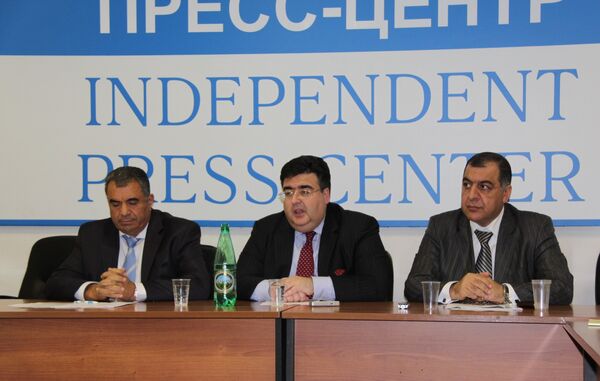A controversial Russian politician and former State Duma heavyweight announced in Moscow on Thursday the creation of a Russian public movement to support jailed Kurdish militant leader Abdullah Ocalan.
Alexei Mitrofanov, known for colorful public antics outside the political arena, said the primary goal of his new pro-Ocalan "committee" was to push for the release of "World Prisoner Number One," as well as to draw public attention to the humanitarian aspect of the conflict between the Turkish government and Kurdish militants.
The announcement came a day after 24 Turkish soldiers were killed in a series of attacks by fighters from Ocalan's Kurdistan Workers' Party (PKK), one of the worst one-time losses for the Turkish military since the beginning the PKK's armed struggle against the Turkish state in the mid-1980s.
Ocalan, 63, who is viewed by most Turks as a "terrorist" responsible for the deaths of thousands of troops and civilians, has been serving a life sentence in a prison on an island near Istanbul. He was originally sentenced to death in 1999 after being captured in Kenya earlier that year. That verdict was commuted to a life sentence three years later, when Turkey abolished the death penalty as part of its efforts to secure European Union membership.
Ocalan founded the PKK, which Turkey, the United States and European Union view as a terrorist organization, in 1978, six years before the group launched what was to become a full-fledged armed struggle for an independent Kurdish state. The conflict has since claimed the lives of more than 40,000 people, many of them civilians, both Turkish and Kurdish. During the trial, Ocalan admitted to the violent nature of the PKK and pleaded for mercy.
There has been no reaction to Mitrofanov's initiative from the Turkish authorities. A written request for comments sent to the Russian Foreign Ministry was not answered as of late Thursday.
Political analyst Viktor Nadein-Rayevsky from the Russian Academy of Sciences' Institute of World Economy and International Relations said Turkey has always reacted "very negatively" to initiatives like this.
"The Turks treat those who support Kurds very badly," he said.
Turkey is Russia's major trade partner and the second largest importer of Russian natural gas after Germany. Ankara is yet to agree to the construction in the Turkish territory of a section of the South Stream pipeline designed to transport Russian gas under the Black Sea to central and southern Europe bypassing Ukraine.
Late last month, Turkish state energy company Botas said it was not going to extend one of its contracts with Russian energy giant Gazprom on the annual supply of 6 billion cubic meters of Russian gas, after Moscow failed to agree to cut gas prices. Gazprom has now to agree with private Turkish companies to purchase its fuel in order to recover the losses.
The former Soviet Union supported the Kurdish rebel cause and PKK members were "quite active" in Russia before the Soviet collapse, Nadein-Rayevsky said. But Russian leaders have since distanced Moscow from the Kurds and have condemned PKK attacks, he said.
After being expelled from Syria under pressure from Turkey in 1998, Ocalan sought refuge in Russia but was rejected.
Mitrofanov complained on Wednesday of a lack of understanding among the Russian leadership that the Kurdish factor "will have a very big influence" on the future political situation in the Middle East. One of his committee's goals is to "prove" that the Kurdish issue should be treated as a "priority," he said.
Middle East expert Yevgeny Satanovsky rejected suggestions that there were up to 500,000 Kurds in Russia, saying the Kurdish diaspora in the country has no more than 15,000 members.
"Politician Alexei Mitrofanov has the right to demand freedom for anyone," he said. "It's not his problem how it will affect our relations with Turkey - we have the president, the prime minister and the foreign minister, as well as other people who deal with foreign policy for this."
In a statement passed through his lawyers last May, Ocalan threatened the Turkish government with "great war" unless Ankara launches "meaningful" talks with Kurdish groups within a few weeks. Wednesday's attacks were the latest in a series of deadly assaults on Turkish troops carried out by PKK fighters in the past few months.
The Turkish army responded to the attacks by launching airstrikes against PKK camps in northern Iraq and sent troops across the border to punish the insurgents.
In late February, the PKK announced that it was abrogating its unilateral ceasefire declared in August 2010, citing the Turkish government's reluctance to make concessions to Kurdish demands.
MOSCOW, October 20 (RIA Novosti)


